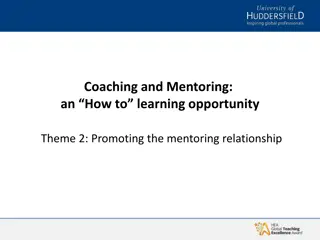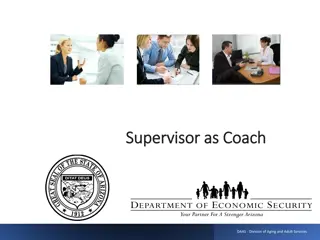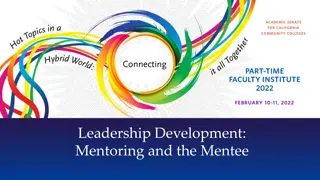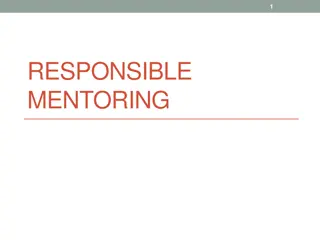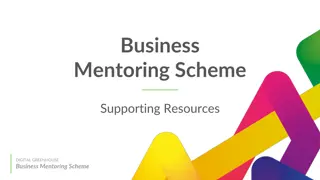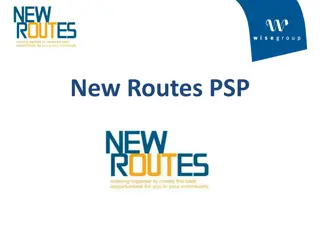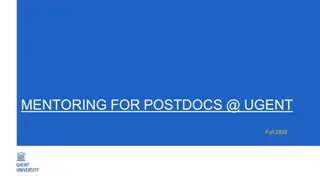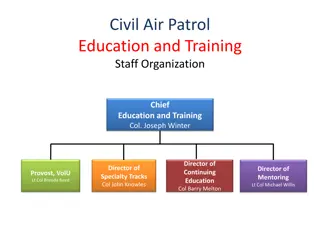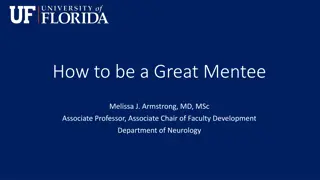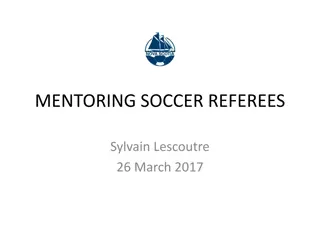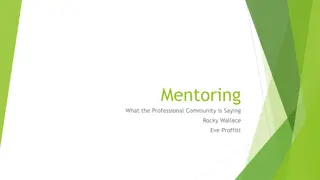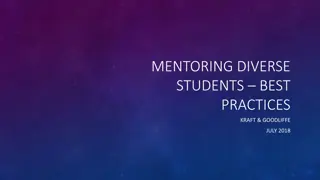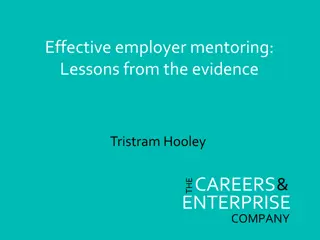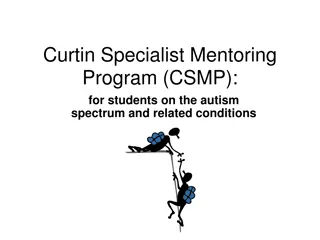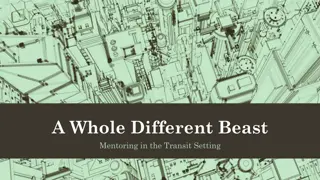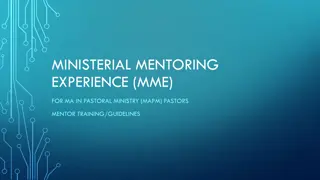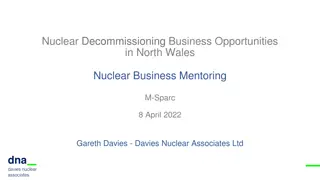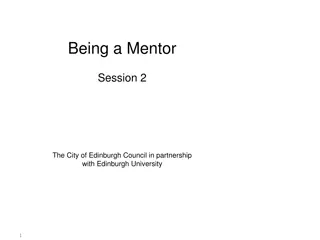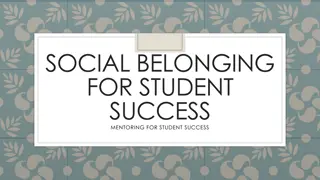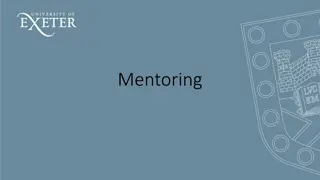Effective Mentoring in the Individual School Setting
This study explores the key strategies for successful mentoring in the school environment, as identified by educators from Hardin Valley Academy, Hardin Valley Elementary, and Central High School. The authors, David Combs, Tod Evans, and Katie Lutton, share practical insights and best practices to enhance mentorship programs and support individual growth within educational institutions.
Download Presentation

Please find below an Image/Link to download the presentation.
The content on the website is provided AS IS for your information and personal use only. It may not be sold, licensed, or shared on other websites without obtaining consent from the author.If you encounter any issues during the download, it is possible that the publisher has removed the file from their server.
You are allowed to download the files provided on this website for personal or commercial use, subject to the condition that they are used lawfully. All files are the property of their respective owners.
The content on the website is provided AS IS for your information and personal use only. It may not be sold, licensed, or shared on other websites without obtaining consent from the author.
E N D
Presentation Transcript
Effective Mentoring in the Individual School Setting David Combs, Hardin Valley Academy Tod Evans, Hardin Valley Elementary Katie Lutton, Central High School
Mentoring: One Perspective I ve learned that you shouldn t go through life with a catcher s mitt on both hands; you need to be able to throw something back. Maya Angleou
What the Current Research Says Teacher Retention in Tennessee: Are We Keeping our Best Teachers (Policy Brief, May 2014) 81.5% of teachers were retained in the same school last year Early career teachers are retained at lower rates across the board, and highly effective early career teachers are more likely to change schools or districts than the typical highly effective teacher. For schools where teachers agree that the evaluation process was used effectively (as indicated in the TELL survey), 85% of school s teachers are retained. For schools where teachers did not agree that the evaluation process was used effectively, 73% of school s teachers are retained.
Knox County Statistics For new teachers hired in 2012-2013, the one-year retention of teachers in the county was 79.1%. This could be due to several factors. The average one-year retention rate over the last four years is 81.6%--resembling the state s findings in the policy brief. It is important now more than ever to promote a supportive mentorship of your new teachers!
Mentoring within the Profession: The Vision (Mertz, 2004, p.551) LEVEL OF INTENSITY INTENT ROLE Full Induction (Mentoring) Mentor 6 Patron or Protector Career 5 Advancement (Brokering) Sponsor or Benefactor 4 Counselor, Advisor, or Guide Professional Development (Advising) 3 2 Teacher or Coach Psychosocial Development (Modeling) Role Model, Peer Pal, or Supporter 1
Mentoring Matrix of Support Prot g Increased student achievement Principal Mentor
Mentor Manual Program Details Vision & Operational Guidelines Program Materials Setting up the program, pairing mentors/prot g s, monthly to do items, celebrating accomplishments Program Forms Program & Budget Form
Spending Your Allocation 1. Work with your CMT and to determine your school s priorities. The funds should always be directed toward supporting those priorities. Determine 3-5 activities during the year aligned with your priorities. Estimate the money you need for each activity & budget accordingly. 2. 3.
Budget Items Can pay for: Mentors @ 233.38 each (stipend + benefits) PD materials Speakers Professional books Educational goody bag materials (school supplies, school- themed shirts, etc.) After-school or weekend trainings Substitutes @ 79.35 each (pay + benefits) Funds cannot pay for: Food & drinks Incentives (personal items for goody bags or after-school events)
IMAGINE You have decided to quit your job and leave Knox County. You are determined to open your own school under your own rules. This school is for profit and will be competing with Knox County. With these factors in mind, address the following questions: -What types of teachers would you hire? Why? -Who, from your school, would you take with you? Why? - How would you keep these teachers you have hired and recruited?
So What Do You Need to Start A Mentor Team? Vision/Set of Beliefs Your Team Know What You Need To Do
Vision What do you want your Mentor Core Team to be? Work with Administration What is your community? What are your school s strengths and weaknesses? In what ways could you address these strengths and weakness when you prepare new teachers?
HOMEWORK ACTIVITY: Look at your school yearbook for the past five years. Keep a tally and list of names of teachers who have left the school. Work with the administration to identify the reasons why these teachers left. Separate the reasons into two categories, Those You Can Control and Those in Which You Have No Control. Focus your MCT efforts only on the issues that you can control. That is your vision.
YOUR TEAM Small- Facebook s Two Pizza Team An Administrator Vision Buy-In Information about Mentors and Needs Interviews the New Teachers Develop/Communicate Expectations NOT just Mentors Different backgrounds, content, perspectives Visionaries and All-Stars Active but NOT overworked
What You Need To Do: Separate New Teachers from New to You Teachers http://www.ltps.org/imageGallery/SMinnick16577/First%20Year%20Phases.jpg What are the differences between the needs of those two groups?
http://www.weac.org/graphics/2007-08/aug07/phases.jpg https://teachingtruths.files.wordpress.com/2009/10/mentorship-stages.jpg?w=500
What You Need To Do: Pick and Train Mentors: If Possible, Use the Same Content Area Visionaries Expectations Reflective Coaching 3:45 s for the First Several Weeks (forms, fees, organization, planning, TEAM rubric) See the New Teachers Teach CONTINUALLY REMIND THEM OF WHAT THEY SHOULD BE DOING THROUGHOUT THE YEAR.
SOME IDEAS Professional Development Breakfast Bonanzas Reflection Fridays Create a MCT Handbook for New Teachers Use Katie Lutton s Money Substitutes Book Studies Professional Development
At Hardin Valley Elementary Action Teams Community and School Connection/Character Education Action Team Safety, Health and Security Action Team Technology Action Team Hospitality Action Team Curriculum/RTI Action Team CORE Lead Mentors PLC Development Team Grade level/department chairs
Organization & Needs Assessment 1st Tuesday of month: Leadership Team 2nd Tuesday of month: Staff meeting 3rd Tuesday of month: Action Team meetings 4th Tuesday of month: Training-Miscellaneous Creating/using a building-level questionnaire
Some Questions How do you structure your mentor program? What is your criteria in choosing mentor teachers? Describe how you differentiate mentoring needs of Tier I and Tier II teachers. How do you handle your budget allocation? How do you align your mentor sessions to schoolwide goals?



